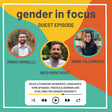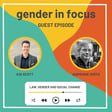
Gender Diversity: Essential Terms Explained
This episode of Gender in Focus dives into the essential language of gender diversity, unpacking terms like transgender, cisgender and non-binary to bring clarity to complex topics. Kai and El explore the differences between sex assigned at birth, gender identity and gender expression, shedding light on how these concepts shape the experiences of trans and non-binary individuals.
Through thoughtful discussion and practical tips, this episode provides actionable insights for fostering respect and belonging. From demystifying what it means to be trans to embracing inclusive language, it’s a guide for anyone striving to make a meaningful impact.
Tune in to deepen your understanding of gender terminology and empower yourself to create a more inclusive and compassionate world.
To learn more tips and tricks from us here at TransFocus, sign up to our newsletter and receive our FREE resource: "Dos and Don'ts for Supporting Transgender Coworkers"
Join us on social media:
LinkedIn | Instagram | TikTok | Threads | Facebook















